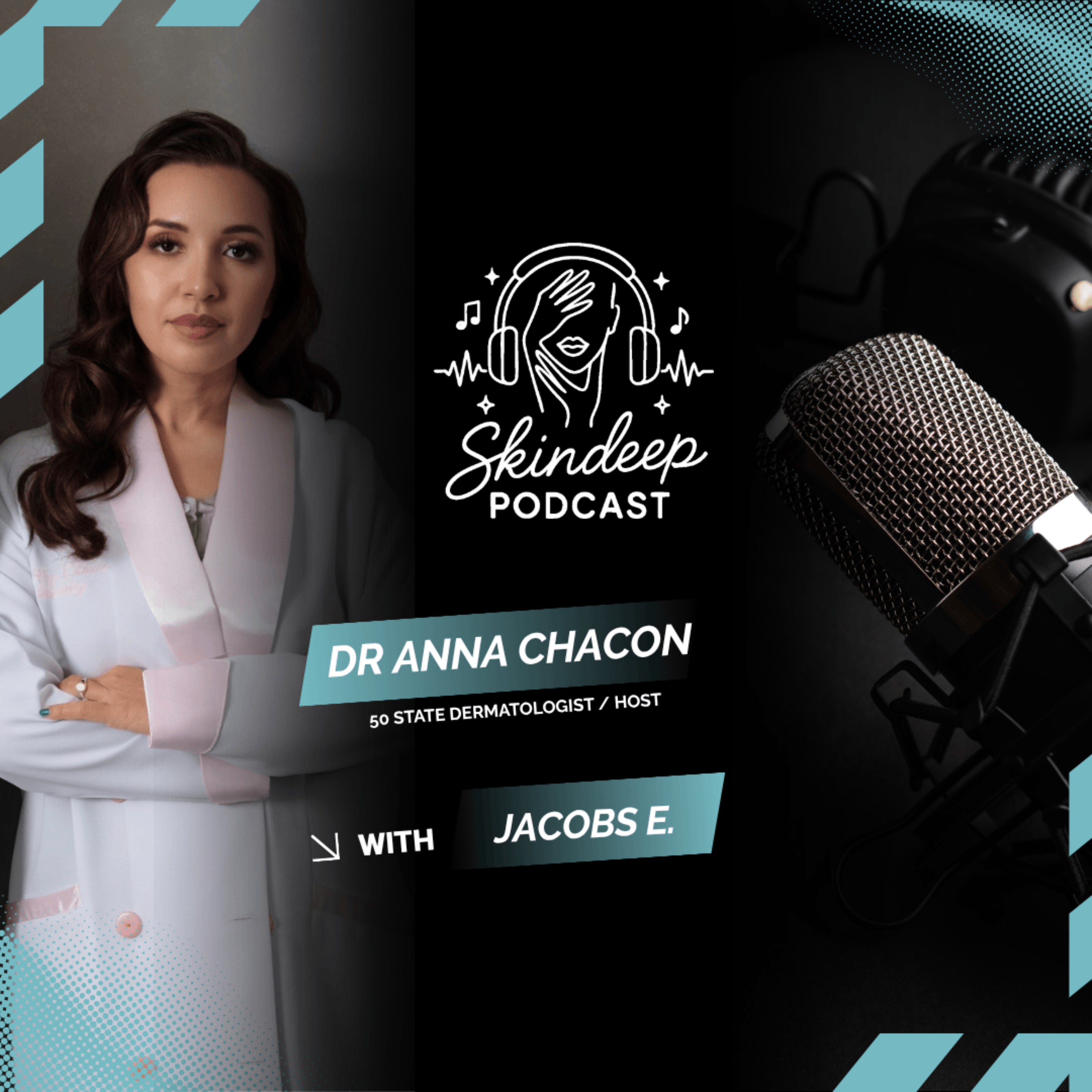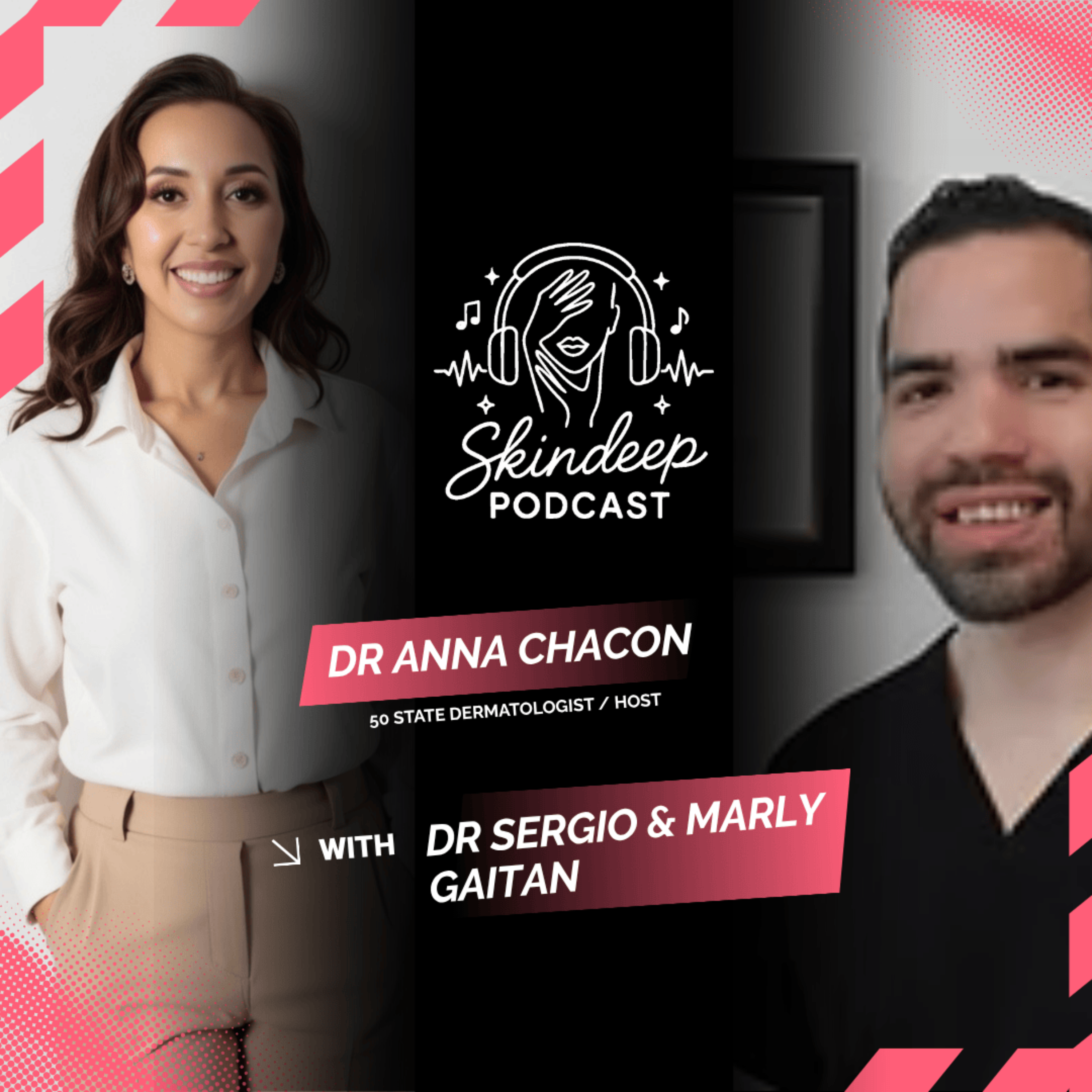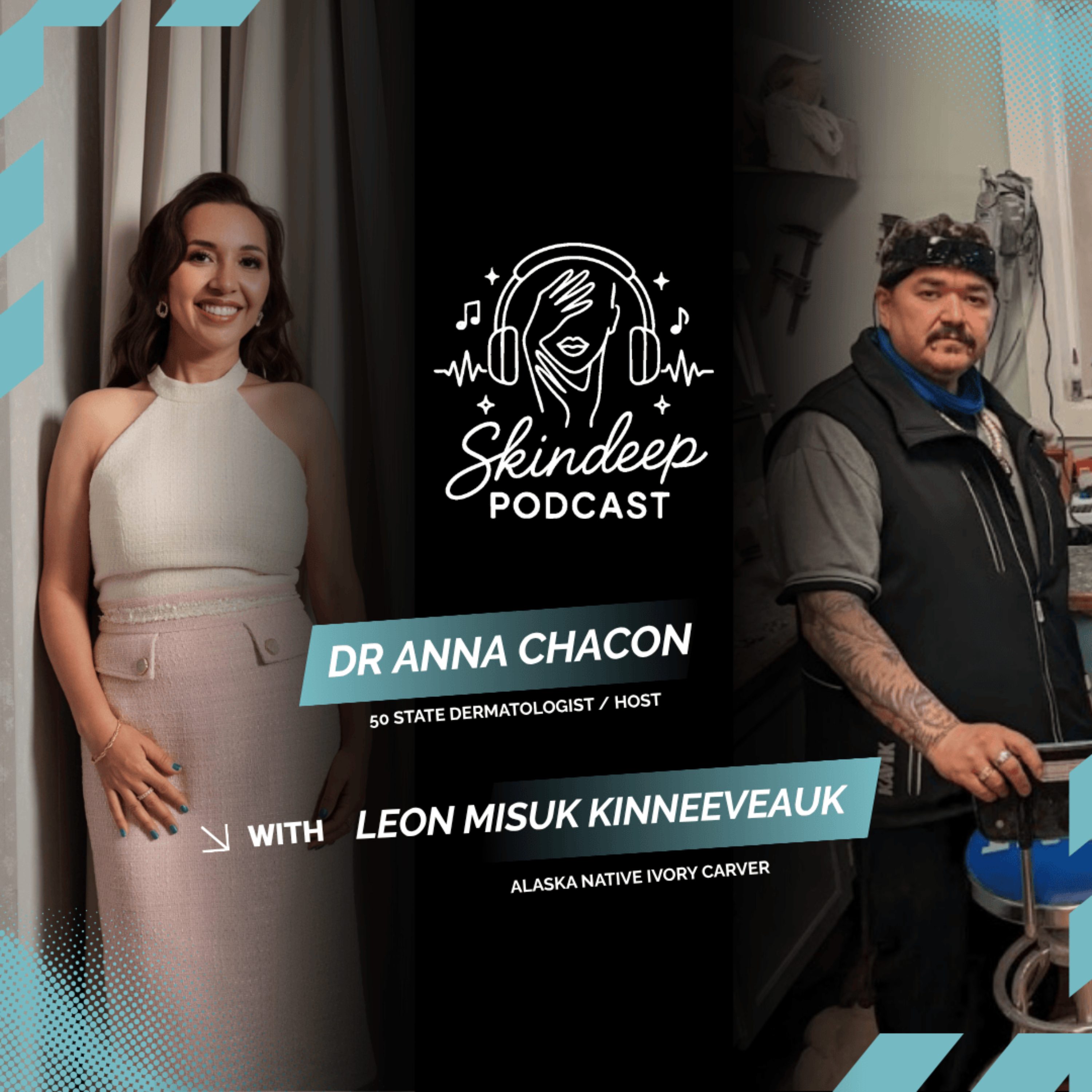Episode Transcript
[00:00:00] Speaker A: I want this gone. I want to, you know, look nice in my photos. And my primary care doctor at the time was like, yes, absolutely, it's a lipoma. Let's get you in. And when I went to get it surgically removed by a dermatologist in my town, he cut into it, went, oh, I have to stop right here. This is not a lipoma.
[00:00:21] Speaker B: Welcome to skin deep. I'm Dr. Ana Chacon, and today we have a very special guest joining us. Get ready for some expert insights you, you won't want to miss. If you don't mind introducing yourself, I'm Jacob Edwards.
[00:00:34] Speaker A: I'm on the west coast of the United States. I'm 35. I've been seeing Dr. Ana about my chimeras disease and got invited to their.
[00:00:43] Speaker B: Lovely podcast, tell Everybody what Kimura's disease is. Because even some doctors don't know or probably have never seen a case of this. For the people that have never seen a case, break it down as to what it actually is.
[00:00:59] Speaker A: My explanation really stems from 10 years ago, so when I first got my diagnosis. But as far as I understand, it is fatty, benign tissue that is growing between my muscle structure that causes bulging and sometimes not obvious, but it can be in places, especially in your head, your feet and your groin especially. I luckily it's mostly been in the head region, specifically along my jawline and forehead. But I have seen other cases that have gone elsewhere, including all over the body, because it can happen everywhere. It's just those were the hot zones.
[00:01:40] Speaker B: If you don't mind sharing your journey with it. How was it initially diagnosed? How did you present?
[00:01:46] Speaker A: I originally presented with a baseball sized lump on my head, which for most people is going to be very concerning. My family has a history of lipomas, so that's just kind of what we thought. But it was getting so big and I was getting married, it's like, cool, I want this gone. I want to, you know, look nice in my photos. And my primary care doctor at the time was like, yes, absolutely, it's a lipoma. Let's get you in. And when I went to get it surgically removed by a dermatologist in my town, he cut into it, went, oh, I have to stop right here. This is not a lipoma. And he sent me up to OHSU in Portland to get a diagnosis. And that took about six months for them to debate. There was some talks of, like, possible cancer and other things going around. And I know there's another disease that is very similar to chimeras, and it Has a much longer name. And that was what the main debate was about. They present very similarly, but I guess where like the tissue deposits might be different.
[00:02:55] Speaker B: Angelymphoid hyperplasia with eosinophilia.
[00:02:58] Speaker A: Yeah, that mouthful, that. Yeah.
So that was the start of my diagnosis. And they did a bunch of biopsies and some scans and found it also behind my ear, inside my jawline, and on my forehead where we originally saw it. But it wasn't too bad at that time, so I wasn't as worried. You know, having a diagnosis can really just help ease a lot of things. Unfortunately, at that time there was even less options to treat it, which was just surgery at that time. And that was not a step I was willing to take. And to be honest, they biopsied my forehead so much that the baseball size piece was gone. So they kind of already surgically removed the part I hated the most.
[00:03:46] Speaker B: Yeah, it seems like a very long, lengthy process.
Did you meet other people with this condition? I know you were mentioning to me a community on Reddit. Anyone in your family have this? Anyone locally? Any. Anyone that you try to meet to share experiences or what works and what may not work?
[00:04:06] Speaker A: No, unfortunately at that time, the doctor that I had, Dr. Pena, he was wonderful. Really, you help with the anxiety of the situation. And he was going over it, but because he looked to see what options we had. And I ended up being the first person on the west coast with this diagnosis. So there wasn't even like a local area that had seen it. And I guess at least at that time it was mostly seen in Asian populations. And so I ended up being in like the first few Caucasians in the United States to have it.
So there wasn't even a lot of places to go find a community about it because most of the papers and things like that that he could find were from like China and Japan. So I was left mostly in the dark about it. And it wasn't until two years ago that I even found anyone else posting on Reddit about it, wondering what it was, how to treat it, just to talk to people. So I talked to that person for about six months. They were a 45 year old woman. That was all the information they gave me about themselves, just to check in with each other. And then I actually recently lost contact with them. But it was after you actually started talking to me about the dupixent and I let them know to say, hey, my doctor thought of this idea, maybe talk to yours to see if it's an idea that might work for You. And then I actually never heard back from them after that, unfortunately.
[00:05:34] Speaker B: Interesting. And then tell me how you came up with this. Because I was looking, as I was preparing for the podcast, at possible treatment options for this very rare disease. And it's mostly surgery. Everyone says it's mostly surgery, but as you know, if you do surgery, especially on a place like the cheek, you're going to leave someone very scarred. How did you come to learn about dupixent as a treatment option?
[00:06:00] Speaker A: So that is actually from my lovely mother, who always tries to have my back. And she just constantly kept Google searching every couple of months just to see if there was new information about my disease or anything. And she had sent me a post. This was before the actual, like, clinical trial had come out that we could, like, use for us. It was a Chinese post about someone using duplumab, which is the chemical name, the medicine name for dupixent.
And it was in China. And she sent him, and she's like, hey, look at this. This could be a new option. So we actually, once we found that one paper, her and I both put, like, flags out there for any new information coming about with duplumab for chimeras. And just over a course of about a year, we finally got some clinical trials that were going on about it. And so it just. It just kind of snowballed from there. There was the one, and then suddenly there was like, five. And then we're like, okay, I need to go talk to a doctor about this, because it looks like a viable option. Specifically, I want to say the one I sent you, the picture of the guy who had it on his cheek. And they showed after so many months, and it was completely eradicated on his cheek. And that really spurred me to be like, okay, this could be me. I need to go talk to someone.
[00:07:26] Speaker B: Tell everybody. What's your experience with dupixent so far? Side effects. Was it difficult? Easy? How you feel like it's impacted your. Your course of treatment?
[00:07:37] Speaker A: I think a major part of that is going to come into that. I also have eczema and severe asthma. So for me, dupixent was a miracle drug. It was like, hey, you could get rid of your chimeras. It could treat your asthma and your eczema. I was like, wow, okay. Benefits all around here. So my first time taking it was really easy because you got me the auto injector pens, which really helps with my needle anxiety. But I had slight stinging for about 30 seconds after the injection. And I've never experienced A side effect with it. It has been the easiest medicine I have ever taken, and it took about, I want to say, six weeks before I noticed any true, like, difference with my lungs and my eczema. And then I want to say about. What was it? Three months in, I could actually start to see the parts of my chimeras going down that was more noticeable. So where they had originally biopsied on my forehead, from there actually a line was going down to my eye and that was already being diminished. So I was seeing some returns. It says it can take six to like, 12 weeks for side effects to come in. So I've been. I was vigilant, looking for anything that might be like, oh, no, this isn't for it. And I never experienced a side effect from the medication, which I realized might not be typical for everybody. But it was quite wonderful for me because, as you've seen, giving me, like, oral medications that we had to try instead, I have some bad reactions to medicines. I tend to get a lot of the side effects. And so to have a medicine that I didn't have any side effects was quite nice.
[00:09:28] Speaker B: That's important because you had had a procedure in your forehead and it seems like it grew back, but then. Yes, then the dupixent made it go away. So the surgery isn't a good option. Not just the scarring, but it can just grow right back in that.
[00:09:43] Speaker A: Yeah. I probably should have mentioned before, but at the time of my diagnosis, one of the reasons we didn't want to go to surgery was I was told it had an 80% chance of coming back. So even though you spent all this money getting it exercised from your face, the likelihood of it coming back was just so astronomical that even most doctors were like, unless if it's causing you the inability to breathe or see or things like that, it's just not going to be worth your time to do until it gets, like, too much for you to handle.
[00:10:15] Speaker B: How long have you been on dupixent? And in terms of the case reports, I'm assuming the patients continue doing it because I have seen some case reports.
For the most part, it looks like it's shrunken, the camera is, and there's maybe some lax tissue, like and I were talking about earlier, but that's very fixable later on. It's just very fixable and easy to deal with.
[00:10:40] Speaker A: Yeah, I think I've been on the dupixent six months now. So if I remember correctly, the case that I was looking at photos for, it was four months the person had seen major reduction and then within, I believe it was a year, they had seen full remission of it. Now, their presentation did seem to be less extreme than mine at the time. They got to Dupixent before I could. So while I would love for, you know, by September for it to be totally gone, I realized it could take longer as my body is getting rid of it on its own. And as we stated, I have seen reduction in areas. It does seem to have attacked the smaller areas first. So I don't know if it is equally like leveling. And obviously the smaller areas I'm going to notice going away, but those are gone. And my major presentation, which is on my left cheek, has significantly been reduced to the point where even people at work that have seen me before go, oh, my goodness, is that actually that much smaller now? Because it looks so good and I'm not. Which nobody really wants to have what makes them different called out. But for so long I got people going, oh, my goodness, are you okay? Is it cancer? Is it all these things? And so I'd always have to go into that. No, it's this. And have to sit there for like three minutes explaining what that even means. And now people are doing kind of the opposite of going like, wow, it's getting treated and it's looking great. And that's just like unprompted from people who, in the nicest way, don't often care about others. So, like, even that, it's just people have got. Can actually see a major difference going on at five months. And so I'm very hopeful that it will keep that trend.
[00:12:30] Speaker B: And I'm going to show some of the audience some pictures for people who have never seen chimeras. But basically, if you type chimera's disease on Google, you'll see and these are apparently it kind of hugs, you know, very central areas, like lateral aspects of the face here. This is similar location here. This is a angio lymphoid hyperplasia with eosinophilia that I've actually seen before.
And that presents differently. Just pink bumps, but. And then there's this case here of dupixent. I'm wondering if this was a case that you read about.
[00:13:07] Speaker A: It was, yes, the Frontiers case. It's still actually in my bookmarks on my computer.
[00:13:12] Speaker B: Yeah. And then here you could see some laxity. But this is relatively easy to fix later on, you know.
[00:13:20] Speaker A: Yeah. Especially when I was considering like, oh, full facial surgery or juju. Fix it and maybe get a facelift.
[00:13:27] Speaker B: Later, you know, that's interesting. And then what would you have to say to patients with Kimura's disease? What advice do you have and what do you wish more people knew about this condition?
[00:13:41] Speaker A: Finding the right doctor is important.
So while I've been able to work with you steadily, when I was at ohsu, every three months the doctors would change out and I really felt that hindered me. So, like, while it is an extraordinary rare disease and you're going to be sent to like a learning hospital and things like that, once you have your diagnosis, find you a steady doctor who is willing to take the time to learn about it, which obviously I would highly suggest you because you've really worked well with me on that. And as far as things I wish I would have known was honestly how much it itched, you are not prepared.
[00:14:25] Speaker B: Wow.
[00:14:26] Speaker A: It's the best way I can describe it for at least me. You know, I. Obviously it does not tell me in a lot of the case studies if this was the same for other people, but it felt like poison ivy underneath my skin 247 with no relief. The only time I got even the smidgen of relief was when I was taking Zyrtec just because of its, you know, the antihistamines. And so whatever was going on was causing a lot of itching and that was insanity. And I want to put on the record, Dupixent solved the itching. It does not itch like that. Even though I have the this disease. And that alone clears your mind so much just for your day to day operations that you do not realize that this benign disease is taking away from you. Like we think of like things like cancer and how much it hurts your life and things like that. But even things that are quote unquote benign affect your daily life so much that nobody prepares you for. Like I said, I didn't want pictures taken of me for years, which is horrible because that means now I don't have photos with my nephews growing up, my grandpa who's, you know, getting late in life, I don't have a lot of photos with him, you know, with my mom, things like that. Your self esteem from it is so important for you to get back into your own control that I think I wish at the time I would have like been prompted to go to a counselor about that or anything like that to work in tandem with a doctor. But obviously I was working with a lot less information than someone viewing this podcast is now going to have. So I think taking the mental health aspect into it too Is something that's so important for you to get on your treatment plan just because it does more damage than you think, and getting the diagnosis and hopefully dupixent might work for them.
That solution, it helps so much.
[00:16:25] Speaker B: I think that's very important. I wasn't aware of how itchy it was, but yeah, it can definitely affect your quality of life and stop you from being able to think, enjoy things, just live a normal quality of life. So that's excellent that it's taking care of those symptoms. Any advocacy or awareness besides the podcast, which I think, you know, there's more technology now to make people aware of conditions that they could be suffering from and not know where to look.
Besides the Reddit group and trying to keep in touch with some patients, are you involved in any awareness efforts of the condition?
[00:17:03] Speaker A: I am not currently. Just because it was not an aspect I wanted to really define my life. And so, like, I didn't put myself out there for that, especially at the time with there was no solution.
So for me personally, it was kind of like dwelling on it and I didn't want to do that to myself. However, now with like Dupixent, I have been searching for more groups or even just random posts that might be out there on different web pages where people just don't even know where to look because how would you know where to look, you know? And so that's why I like coming on the podcast, I think is very important, because that's just another thing for if someone's typing in a search bar that this might come up for them and, you know, give them some clues on where to go find answers, even if this wasn't the correct answer for them. That's something I would, you know, want out there. Unfortunately, with it being medical, a lot of places don't allow you to post about it because we're not, you know, I'm not a doctor and I can only post about my personal experiences with it. And with a lot of the censorship out there, talking in medical terms gets things flagged. And so it does make it harder to find people who are going through the same thing as I am.
[00:18:18] Speaker B: Well, thank you so much. Thank you, Jacob.
[00:18:20] Speaker A: Yeah, thank you so much.
[00:18:22] Speaker B: Yeah. And thanks for talking about it. I really appreciate you coming on. I know this wasn't easy and dealing with it hasn't been easy, and hopefully you continue to improve and people can see your progress.
I'm very, very hopeful for complete resolution of it, although it might take time and that this can potentially help a lot of Others. Dupixent is mostly used for, as you know, atopic dermatitis, but it can be used. And I mentioned some case reports to you the other day, but I've heard of reversing autoimmune hair loss like alopecia areata, where people lose all the hair on their lashes, armpits, brows, and they've completely recovered their hair. So it kind of has some properties, some cellular properties that just help treat conditions that are immune mediated, such as this one. I'm very hopeful and thank you for finding me and thanks for allowing me to share in your success and your improvement.
[00:19:22] Speaker A: Yeah, I really appreciate you having me on. It has been a pleasure to work with you over this. You've made just getting on the dupixent an easier time and keeping up with me about, like, how my progress is going. But at the same time, you're not overbearing, which for, you know, a lot of people might be too much for them to handle with, like, medical things going on just to add on to it. So, like, your bedside manner is very gentle, which is wonderful. It's exactly what I needed to keep me going on this.
[00:19:54] Speaker B: Thank you so much. That's the best thing I've heard all year. So I'm very happy and have a great Sunday.
Hope you're watch the Super Bowl a little bit. And thank you for sharing your story.
[00:20:05] Speaker A: Yeah, thank you so much. I hope you have a wonderful rest of your day.



